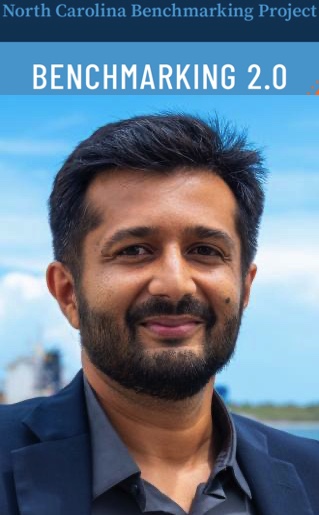School of Government Relaunches a Revitalized “Benchmarking 2.0”
The UNC School of Government is pleased to announce the relaunch of its North Carolina Benchmarking Project. Restructured and revitalized as Benchmarking 2.0, the project returned in 2022 under the direction of faculty member Obed Pasha. Originally established in 1995, it is the longest running of its kind in the United States, allowing participating local governments a comparative basis to assess service delivery and costs.
Pasha takes over the helm as director from Dale Roenigk, who previously led the project until his retirement from the School.
The Benchmarking Project enables participating municipalities to compare themselves with other units and with their own internal operations over time. Its aim is simple—yet crucial—for these communities: to help provide improved services to residents.
The services benchmarked reflect the breadth of disciplines and responsibilities local governments employ for communities:
- Central human resources
- Solid waste management
- Emergency communication
- Fire services
- Police services
- Asphalt maintenance and repair
- Building inspections
- Parks and recreation
- Fleet maintenance
- Water services
- Wastewater services
Through access to an intuitive, visual dashboard of data; performance strategy sessions; and annual benchmarking reports, project partnerscanboth develop solutions to systemic organizational issues and replicate successes throughout other sectors.
As the lead of the relaunch, Pasha steered the second iteration to retain a focus on its overarching “big picture”—ensuring municipalities can make needed changes to improve service delivery—while also introducing new features to improve its efficacy and outcomes.
Benchmarking 2.0’s new features include streamlined data collection, immediate analysis and reporting, and enhanced interaction between participating departments.
“Our focus has really pivoted to organizational outcomes and service delivery, fewer metrics, streamlined data collection through the online tool, flexible dashboards for analysis, and performance strategy sessions that bring departments together for discussions and interactions,” he said.
10 municipalities across the state are currently participating in Benchmarking 2.0, with five out of the 10 largest North Carolina municipalities among them. Many local government employees of participating units have already seen the positive effectsof partnering with the program.
“Being a part of the Benchmarking project, and process, allows us to see how we compare to agencies that are similar. It shows us areas we can improve upon, but also where we exceed,” said Christine Moore, operations manager for the City of Greensboro’s Emergency Management department. “Having such a detailed report will, no doubt, help us in the future as we approach our local government for higher wages, increased staffing, technology, and more.”
Looking ahead, Pasha and his team aim to amplify results like these to communities across North Carolina. Benchmarking 2.0 is looking to expand its services to potential new partners, with each being granted access to the program cost-free for one year.
To learn more about Benchmarking 2.0 and explore the benefits of becoming a partner, visit benchmarking.sog.unc.edu.



